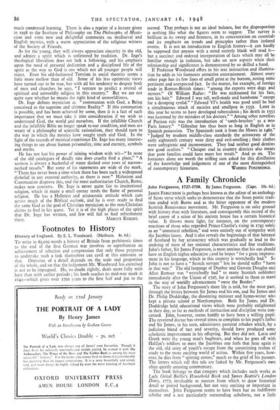Footnotes to History
History of England. By E. L. Woodward. (Methuen. 4s. 6d.)
To write in 65,000 words a history of Britain from prehistoric times to the end of the first German war involves so superhuman an achievement of selection and compression that only those prepared to undertake such a task themselves can cavil at this omission or that. Omission of a detail depends on the scale and proportion of the whole, and on that the judgement Mr. Woodward has exercised is not to be impugned. He, no doubt rightly, deals more fully with later than with earlier periods ; his book reaches its mid-way mark at 164o—which gives over 1700 years to the first half and 30o to the second. That perhaps is not an ideal balance, but the disproportion is nothing like what the figures seem to suggest. The survey is brilliant in its sweep and firmness, in its concentration on essentials and its emphasis on trends and principles rather than isolated events. It is not an introduction to English history—it can hardly be supposed that anyone with a mind entirely blank will read it— but a succinct and ordered interpretation of facts which may all be familiar enough in isolation, but take on new aspects when their relationship and significance is demonstrated by so skilled a hand.
If Professor Woodward offers in his text instruction and illumina- tion he adds in his footnotes attractive entertainment. Almost every other page has its few lines of small print at the bottom, noting some pertinent and unexpected fact. In the matter, for example, .of foreign trade in Roman-British times : " among the exports were dogs and oysters." Of William Rufus : " He was nicknamed for his face, not his hair." Edward I was tall, well-made and handsome " except for a drooping eyelid." " Edward VI's health was good until he had a simultaneous attack of measles and smallpox in 1552. Later in this year he seems to have developed tuberculosis ; his death in 1553 was hastened by the mistakes of his doctors." "Among other novelties of Puritan rule was the introduction of ' tooth-brushes ' as a new Paris luxury." "Gibraltar has thus been as long in English as in Spanish possession. The Spaniards took it from the Moors in 5462." " Judged by modern middle-class standards the aristocrats of the early eighteenth century were dirty and evil-smelling ; their clothes were unhygienic and inconvenient. They had neither good dentists nor good oculists." " Cheaper coal in country districts also meant that poor families could have more hot meals." And- so on. The footnotes alone are worth the trifling sum asked for this distillation of the knowledge and judgement of one of the most distinguished


































 Previous page
Previous page